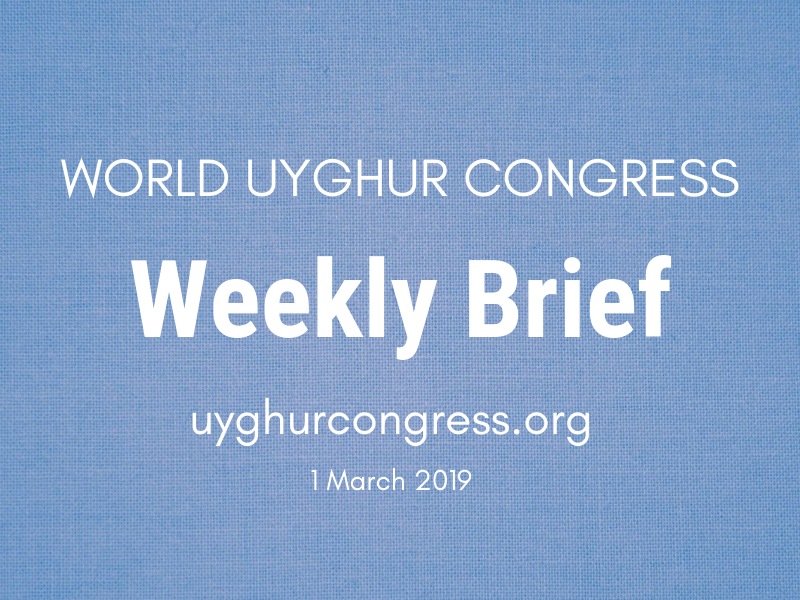Weekly Brief March 1st

World Uyghur Congress, 1 March 2019
 States Raise Uyghur Human Rights Crisis During UN Human Rights Council Session
States Raise Uyghur Human Rights Crisis During UN Human Rights Council Session
Despite numerous attempts by the Chinese government to silence criticism and avoid scrutiny about its horrific repression of Uyghurs and numerous other human rights violation ahead of the 40thsession of the UN Human Rights Council, the human rights crisis in East Turkistan and the mass arbitrary detention of millions of innocent Uyghurs was raised once more by a number of states in their opening addresses at the session.
The Turkish Foreign Minister Mevlut Cavusoglu used his statement at the UN HRC session to call on Beijing to protect freedom of religion and cultural identity of the Uyghur people. While Cavusoglu didn’t specifically mention mass detention camps in China, he mentioned that reports of human rights violations against Uyghurs and other Muslims were a serious cause for concern. A distinction should be made between “terrorists and innocent people”, Cavusoglu added.
The U.K. joined Turkey in raising the Uyghur issue at HRC 40 session, where Lord Ahmad, minister of state at the Foreign and Commonwealth Office, said: “We are deeply concerned about the persecution of Uyghur Muslims in Xinjiang”. The treatment of Uyghurs was also highlighted as an issue of particular concern by the Australian Minister of Foreign Affairs H.E. Ms. Marise Payne, in her statement at the UN HRC 40 session. Crucially, the European Union urged China to, “allow meaningful access to Xinjiang for independent observers including for the UN High Commissioner for Human Rights.” As usual, China has denied accusations of mistreatment and deems criticism within the U.N. council to be interference in its sovereignty.
The World Uyghur Congress along with other prominent human rights NGOs including Human Rights Watch, Amnesty International and the International Service for Human Rights have been calling for concrete action to be taking on the camps at this session of the Human Rights Council, including a resolution and a fact-finding mission. The Human Rights Council must not continue to ignore one of the most serious and pressing human rights issues in the world today. The WUC urges all states to raise the camps issue during this session
WUC Representatives Attend the 7th World Congress Against the Death Penalty in Brussels
From February 26thuntil March 1st, representatives from the World Uyghur Congress attended the 7thWorld Congress Against the Death Penalty in Brussels. The event provided an important opportunity to make connections with those involved in the movement to abolish the death penalty and to call attention to the increasing use of the the death penalty against Uyghurs, as well as the growing number of mysterious deaths in custody in the internment camps.
The WUC representatives participated in a number of panels, workshops and roundtables, including a side event entitled ‘Engaging China on the Death Penalty: Challenges and Opportunities’ organized by the Rights Practice. During the event, the WUC representatives asked the panelists about the rising number of death sentences given to prominent Uyghurs including scholars such as Halmurat Ghopur. In particular, the WUC pointed out that the complete lack of transparency, accountability and access to justice for Uyghurs in East Turkistan and the fact that Uyghurs are targeted for such sentences because of their ethnicity, under false charges of ‘separatism’ make the situation around the death penalty in China particularly disturbing.
The death penalty abolitionist movement must pay more attention to documenting and abolishing the death penalty in China. China executes the most people of any state in the world, yet little to know progress is being made in the country with regards to abolishing the death penalty and vulnerable groups such as the Uyghurs continue to suffer.
Saudi Crown Prince Seems to Defend China’s Persecution of Uyghurs During Visit
Last week, the Crown Prince of Saudi Arabia, Mohammed bin Salman, travelled to China for a series of talks with Chinese officials. The WUC and a number of other organisations had called on the crown prince to use this opportunity to raise the internment camps and China’s religious persecution of Uyghur Muslims more broadly.
Instead of standing up for Uyghurs and defending freedom of religion, the Saudi leader instead appeared to defend China’s actions, saying that the country had a right to fight ‘terrorism’. This response was extremely disappointing on a number of levels and shows a complete lack of solidarity or empathy. By defending China’s actions, which have resulted in the suffering of millions of Uyghurs and denial of their basic rights, the Saudi leader has tacitly endorsed this crime against humanity and supported China’s propaganda initiative. It is shameful that a leader of the Muslim world would fail to raise and in fact support the actions of a government whose officials have described Islam as an ‘ideological illness’ that must be ‘eradicated’. The crown prince has prioritized trade deals over religion, human rights and the lives of millions of people.

